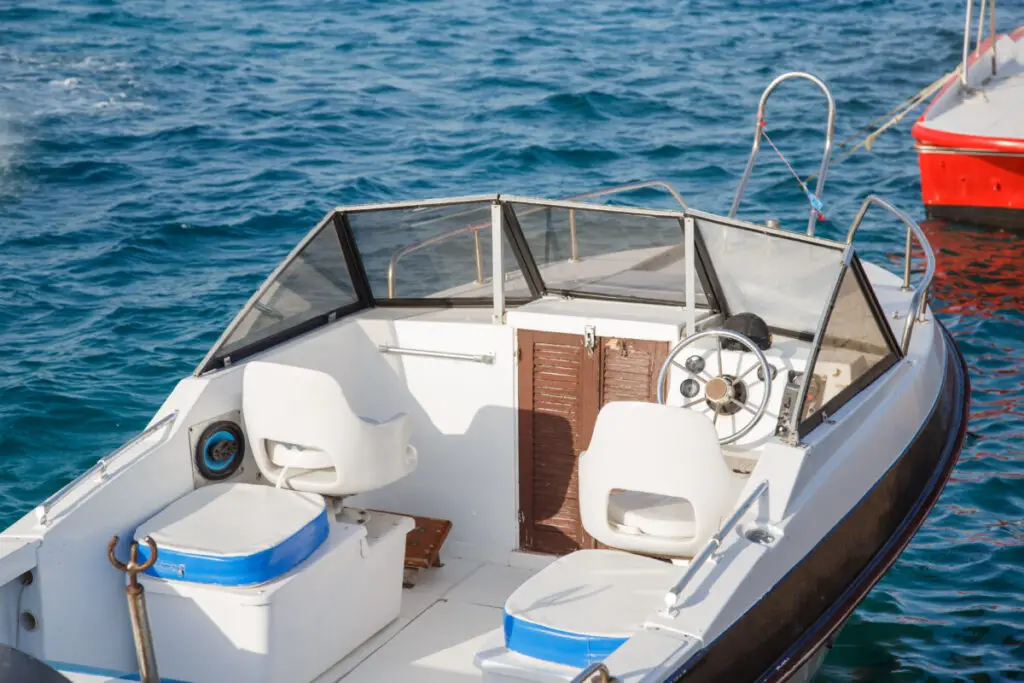When budgeting or buying a used boat, it is essential to know if you need to pay any taxes on it at the sale or annually. In this article, we will see all the types of taxes one needs to pay while buying a “used” boat.
Generally, you will have to pay the sales tax while buying a used boat, along with the registration fee to register the boat under the new name. Most states (except a few) in the US have sales tax on a new or used vessel, which needs to be paid only once unless you lost the proof (receipt).
There are a lot of states that have varying laws about the sales tax and registration of boats, so read on for more information. Because the laws vary by state, be sure to search your own state’s laws to fully understand what you are required to pay before buying a used boat.
Types of Taxes On Used Boats

As previously mentioned, there is a sales tax to pay on a used boat in most states. If you buy a boat outside your state and move it into your state, you may be confused about where to pay the sales tax. Some states require that you pay the sales tax for the state you bought it in, and others want you to pay a tax when you bring it into their state.
For instance, if you bought a boat in Idaho, they require that you pay the sales tax there unless you qualify for an exemption. If you take the boat you bought in Idaho with you to Flordia; then they will need you to register your boat within 30 days. If you did not pay a sales tax on the boat when you bought it, they would collect it from you when you registered it with them. (Source)
You should not have to pay a sales tax twice. If you do not provide proof of the purchase and the sales tax that has already been paid, then your state may require you to pay the sales tax with them, even if you already paid because there was no record. To be safe and avoid paying sales tax twice, make sure you have receipts and proof of purchase. (Source)
Another tax you might have to pay is a use tax (similar to sales tax). The best way to understand this tax is through an example. If you buy a boat in Montana, where there is no sale tax law, you are not off of the hook. Once you bring the boat into your home state, you will be required to pay the use tax on it. Every state that has a sales tax also has a use tax. So, when you register the boat in Idaho, California, Flordia, and so on, you will have to pay the use tax simultaneously. (Source)
The last payment you will need to make on your boat when you initially purchase it is to register and title it in your state. Registration is required for every state, even those without sales tax or use tax laws. This is basically the same as registering your car. The process is just adjusted for boats, so if you understand the process for a car, then it is basically the same for a boat. But, here is a simple explanation if you do not understand. (Source)
In order for your boat to legally be allowed to be ridden on in the water, you need it registered, just like how you need your car registered in your state for you to drive it on the road. One exemption is if your boat is privately owned and you operate it on a private lake. In that case, it can only be operated on private property and not in public. (Source)
For more specifics on how your state handles boats and tax laws around boats, search your official state website to find information on boats, taxes, and registration. Or you can call your local government official office, and they can help you by providing information such as where you can go to get tax and registration settled for your boat.
How Boat Taxes Vary By State?

Every state has its own specific laws about sales tax, how much it is, how it applies, etc., and they all organize sales tax differently. It can apply to almost every product or apply to a list of products. Each state has its government and local government that determine some of these things regarding taxes, so how does each state handle it?
Most states operate using the same outline for their sales tax and use tax laws. The percents change per state, but overall the laws mean the same thing. So by understanding the first section, you will be able to understand how those laws pertain to each state.
Boat taxes, like sales tax and use tax, vary by state, firstly through the price. Some states have a higher sales tax than others, so depending on where you live, where you buy a boat, or where you register a boat, the prices can change.
For example, sales tax in California is 7.25%, in Arizona, it’s 5.6%, and in New York, it is 4.5%. You can look up the sales tax of your state if you do not know it already, and you can use that information to find out how much sales tax you will have to pay on your boat.
Another thing that might be different between states is when they need the sales tax by. For instance, some states want it when you first buy the used boat, but others need it within a certain time period. This can be for many reasons—if you buy through a private seller, and you pay the sales tax when you register the boat, then that is when they will need that by.
Others will want you to go into the office immediately after purchasing the boat to turn in papers and pay the tax. Other times, you pay the tax right at signing. So, look at your state’s online information or call a local office that will help give you some information that applies to your situation specifically.
What States Don’t Require Tax On Used Boats?
States that do not require tax on used boats are Alaska, Delaware, Montana, New Hampshire, and Oregon. These states do not have any sales tax or use tax laws, so you will not be required to pay sales tax to these states when you buy a used boat.
And, if you buy a boat in another state and move it to one of these 5 states, then you can potentially do not need to pay a sales tax unless that specific state requires it. Even though these states don’t have a sales tax, you will still be required to register the boat. You will pay the registration fee, but that should be about all the fees you pay in these 5 states.
It is undoubtedly less expensive to buy a boat in these states than in other states because there is no tax. So you simply have to budget in the fact that there will be those added fees when buying a used or new boat. That way, when you have to pay the sales tax and the registration, you are prepared to pay it, and it doesn’t come out of the blue.
Specific States Tax Laws
Alabama has specific tax laws regarding the purchase of a boat. Depending on the boat you buy or what your boat comes with, you will pay a 2% or 4% sales tax. For instance, a boat trailer sold alone is taxable at 2%. If you buy a sailboat alone, it can be taxed up to 4%. So, check to see what the specific sales tax would be on a used boat in Alabama. (Source)
Arizona has similar laws about sales tax as read above. If you buy a boat outside AZ and the sales tax is less or none compared to the AZ sales tax, you will have to pay the use tax at the time of the boat’s registration. (Source)
In Arkansas, sales tax is collected by the seller on both used and new boats. Some fees include a replacement registration for $1 and a variety of fees depending on the size of the boat.
- A boat less than 16 feet long has a $7.50 fee.
- A boat that is 16 feet long to under 26 ft has a $15.00 fee.
- A boat that is 26 feet long to under 40 ft has a $51.00 fee.
- A boat that is 40 feet long and over has a $105.00 fee.
(Source)
Colorado has specific laws about the registration of a boat when it is bought in-state or out of state. If you bought a boat from another state, you may keep using the boat for up to 60 days with the registration as long as it is current and not expired. But, you will need your own registration after. (Source)
Connecticut has information on how to calculate its sales tax so that you know what to pay. If you buy a boat before July, you will pay a 6.35% sales tax, and if you buy a boat after, it will be a 2.99% sales tax. (Source)
Hawaii does not have a sales tax on boats. Boats must be registered in order to be legally used in the ocean. (Source)
In Illinois, you will need to pay a sales tax based on two comparing prices. One is the simple sales tax which is 6.25%, or you will pay a tax passed on the vessel’s market value. Illinois will take the higher price as the tax. If you purchase from a dealer, they will be the ones submitting forms to the state for you; otherwise, you will have to arrange to pay a sales tax with the state yourself if you buy through a private seller. (Source)
Indiana has a tax on boats if you operate or store your boat on Indiana waters. Depending on the boat’s classification, you will pay an annual tax ranging from $2.00 to $500. The excise tax is a flat $12, but be aware of these unknown costs before purchasing a boat so you can see all of the finances around getting a boat and know what the best decisions would be. (Source)
Kansas requires that you pay a sales tax before registering a boat. If you are buying from a private seller, then have proof of sale or purchase with you, and they will take that price and calculate the sales tax for you. (Source)
In Kentucky, to register a boat, you will pay a simple fee based on the classification of the boat. The prices range from $10 to $65 based on the size of the boat and depending on if it is motorized or not. (Source)
Louisiana has a sales tax of 4.45% on boats until the year 2025. You will be required to fill out a form to register your boat, but there is no fee to obtain or turn in that form. On their website, they answer a lot of questions you may have. (Source)
Massachusetts has a form you will fill out in order for them to charge you with a sales tax fee or for you to inform them that you already paid the sales tax fee. Before going into the office and bringing forms, it might be good to call ahead and ensure you have everything you need to pay the sales tax and register the boat. (Source)
Mississippi also has classifications based on the size that determines the fee for registration. To register the boat, fill out a form specified on their site, a sales receipt, a bill of sale, and a statement on how you obtained the vessel. Not everyone needs a statement—it is for specific cases. (Source)
